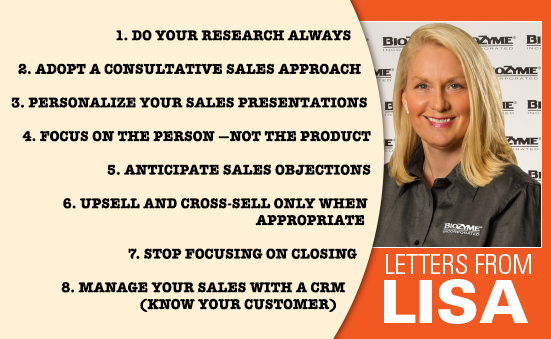We’ve all heard the saying “a good product sells itself.” If only that were universally true. People might line up for the release of the newest iPhone, but it’s not only because of the product itself. It’s also because Apple has spent decades building brand credibility, a unique customer experience and fantastic customer support
No matter the product, a prepared and knowledgeable salesperson is always going to prevail over an underprepared one. So, if you’re looking to increase your sales, read on for eight approaches that will boost your numbers and propel you forward.
- Do your research ALWAYS
- Adopt a consultative sales approach
- Personalize your sales presentations
- Focus on the person—not the product
- Anticipate sales objections
- Upsell and cross-sell only when appropriate
- Stop focusing on closing
- Manage your sales with a CRM (know your customer)
You believe in your company and the products you sell, and that probably shows in your pitches. However, in the current market, most companies aren’t only selling products—they’re selling experiences. In fact, 80% of customers say they’re more likely to do business with a company if it offers personalized and positive experiences
That’s not to say the product isn’t important, but truly unique products are rare nowadays, and the competition is fierce. The way to win customers is through superior, personalized experiences.
Personal selling is a longer game than product-based pitching, but it pays off with a higher percentage of repeat customers and referrals. Personal selling occurs when a sales representative meets with a potential customer to nurture them until they make a purchase.
Personal selling happens face-to-face. Direct contact distinguishes personals elling from other sales and marketing strategies, like public relations or automated sales calls that tout your company’s products or services.
Again, think of the personal selling process as getting to know someone like you would a friend or potential romantic interest who you consistently follow up with. You’re discovering details about what the person likes, dislikes and needs. And in the case of personal selling, you’re also learning about the motivations behind their purchasing decisions.
During this one-on-one interaction, focus on building a sincere relationship with the potential customer rather than on making a sale. Ask the right questions to establish rapport and learn more about their pain points and what they’re looking for in a solution. Listen carefully to their concerns and see how your company’s products or services can help them.
Say you sell mattresses. You might find out your customer’s sleeping preferences by asking:
- Do you prefer a soft or firm bed?
- Do you sleep on your stomach, back or side?
- Did you run into any problems with your previous mattress?
Sure, you could collect answers to these questions through a survey or questionnaire, but you’ll receive a limited response. Personal selling is unique because it entails exchanging back-and-forth information and allows you to dive a little deeper so you can provide that personalized touch.
Remember, 80% of customers say they’re more likely to do business with a company if it offers personalized and positive experiences. You now officially have permission to be “personal.”

